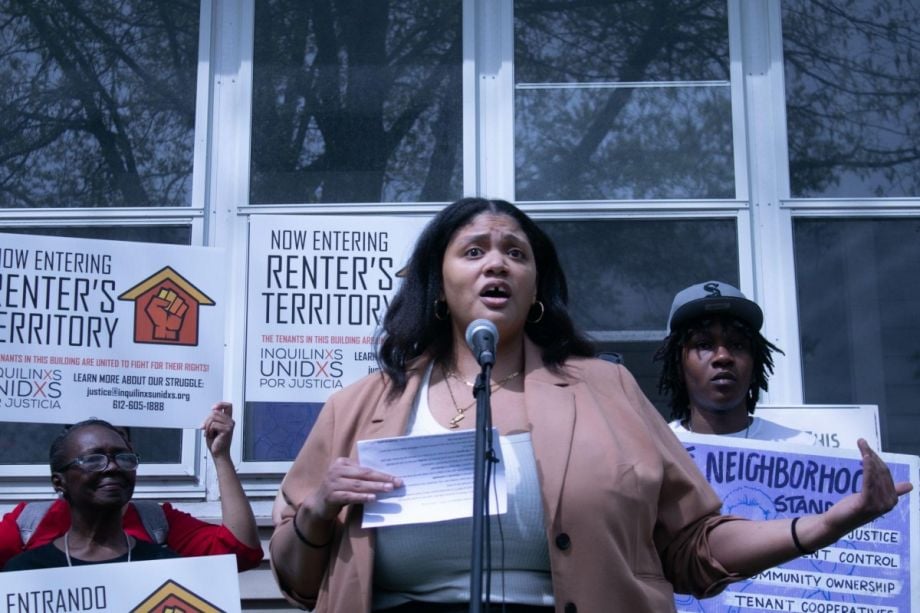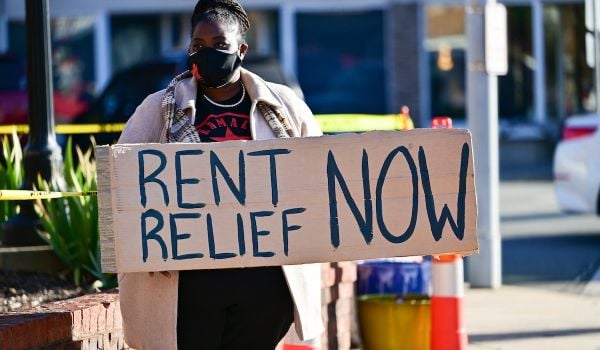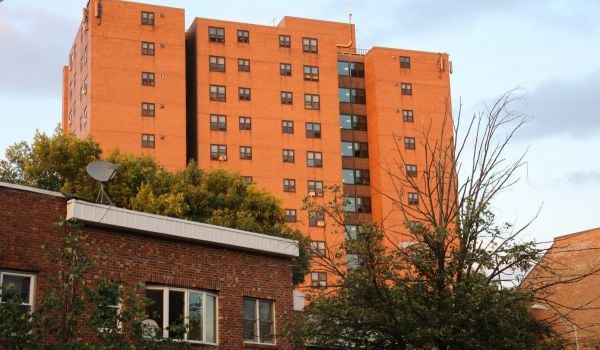This story was originally published on Truthout and has been republished here with permission.
While COVID-19 numbers continue to fluctuate, we are surrounded by calls to get back to normal. But for household debtors, pre-pandemic “normal” was already a crisis.
Even before COVID, 68 million Americans had debt in collections. Between 2009 and 2020, unpaid medical bills became the largest source of unpaid debt, with 18 percent of Americans owing $140 billion in unpaid bills. Student debt was already skyrocketing past $1.3 trillion pre-pandemic, and today stands at nearly $1.8 trillion dollars. Carceral debt is also soaring: 1 in 10 people earning less than $40,000 per year, and 1 in 8 Black people have debts stemming from incarceration. Ten years before the pandemic, racist mortgage lending practices led to unprecedented wealth-stripping from Black and Latinx communities. In the wake of that foreclosure crisis, corporate landlords bought up housing across the country and rent prices soared, leaving at least half of tenants officially rent-burdened in 53 of the 100 largest cities, with Black and Latinx women hit the hardest.
This is not a normal we should go back to.
Household debtors seem to agree, and the pandemic has seen a surge in debtor organizing. Members of the Debt Collective organized to win over $6 billion in student and carceral debt cancellation during the pandemic alone; San Francisco’s Veritas Tenants Association took on the city’s largest corporate landlord and won pandemic rent debt cancellation for all tenants; and municipal, state and federal agencies placed payment moratoria on everything from utility bills to rent to student debt payments.
These victories demonstrate the growing power of debtors. Alone, debtors are vulnerable to creditors’ legal and financial claims on them, but together they are powerful. This is the promise of debtors’ unions, wielding the potential of their collective leverage to renegotiate contracts, fight for debt cancellation, and use their collective power to change how goods and services are financed in the first place (think free college or Medicare for All). As the nation’s first debtors’ union, the Debt Collective has organized student debtors across the U.S. to push student debt abolition and free college for all this far, and we’re just getting started on medical debt and carceral debt.
Though we rarely think of them as such, tenants’ unions are arguably the best-known form of debtors’ union. The power that organized tenants wield over landlords is the power of collective rent refusal until their terms are met. (A late rent payment, in other words, is a form of debt.)
Because much of the well-documented housing crisis in this country emerges from the unchecked and unregulated power of corporate landlords to turn people’s need for shelter into a speculative asset, tenants’ unions must be at the center of any refusal to return to pre-COVID “normal” when it comes to housing.
Tenants’ unions can provide a counterpower to the financialization of housing. As pandemic-related eviction moratoria and renter protections come to an end, now is the time to refuse the dominant paradigm, which treats housing as a speculative asset and privilege for those who can afford it, and organize for social housing — housing that is permanently off the private market, available below market rate, and democratically controlled by municipal governments, nonprofit housing providers, and/or tenants themselves, in limited-equity cooperatives, land trusts or mutual housing associations.
Here’s one promising strategy we hope allies across the country can learn from. The Debt Collective has partnered with the Los Angeles Tenants Union and tenant organizers and legal service providers across the state of California to launch the Tenant Power Toolkit. The first step in so much tenant organizing is the ability to fight evictions. While 95 percent of landlords have lawyers, the vast majority of tenants do not, and in more than half of formal eviction cases, tenants lose by default because they are unable to file a legal answer to their eviction papers within the allotted time (which, in California, is a draconian five business days; Florida is the only other state in the nation with such a punitive timeline). The Tenant Power Toolkit allows a tenant anywhere in California with access to the internet to answer a series of questions about their living situation and their eviction case in Spanish or English. The Toolkit then prepares all the documents the tenant needs to file an answer to the complaint and other essential legal papers. In Los Angeles County — the state’s densest concentration of tenants — the Toolkit can even file the court papers electronically. Once the papers are filed, the tenant is able to stay in their home, and has more time not only to find available legal help but also to connect with other tenants facing eviction and local tenant organizers.
Federal and state eviction protections delayed the eviction crisis that experts predicted at the beginning of the pandemic. But those protections have just ended in California, and the state’s much-touted Emergency Rental Assistance Program has left tens of thousands of people with no help. These households and millions of others across California who are struggling to pay rent are now vulnerable to eviction as rent prices surge across the state.
On the one hand, we can rightly see those millions of people as vulnerable — they are imminently at risk of eviction, displacement and homelessness. On the other hand, though, we can see them as potential members of tenants’ unions, and debtors’ unions more broadly. And this potential power holds true far beyond California.
Nationally, tenants owe an estimated $14,971,000,000 in total rent debt, with 5,721,000 households behind on rent and 5,691,000 children in those households. This surging household debt can be organized — collectivized — into a form of power.
As union organizers, we can ask: Are there private equity landlords to whom substantial chunks of that money is owed? In other words, against which corporate landlords do tenants have potential power to collectively refuse rent?
Nearly $15 billion is a lot of rent debt for individuals and families. But when you reframe rent debt, and even eviction, through collective organizing, they become sources of potential tenant leverage over a system that for too long has prioritized housing not as shelter for people, but as a profitable asset for investors. The Tenant Power Toolkit aims to turn that potential into actual leverage, setting a precedent for similar organizing and debtor unionization efforts in other states.
In a capitalist, financialized economy, where households are deeply in debt for their basic needs, debtors’ unions offer a new form of power. In exercising debtor power, tenants’ unions have long led the way, and the Debt Collective is releasing the Tenant Power Toolkit to strengthen that organizing and allow it to grow to meet the scale of the crisis.
We need to build collective tenant power to target the corporate landlords for whom housing is a speculative asset and not a form of shelter. Now is the time for all of us to understand that if we want to refuse a pre-pandemic normal, we have to build power for the world we want to see. Our debts, paradoxically, can be the collective leverage we need to unleash that power.
Copyright, Truthout.org. Reprinted with permission.
Hannah Appel is a mother, activist and associate professor of anthropology at UCLA. Her work looks at the everyday life of capitalism and the economic imagination. She is a co-founder of the Debt Collective.
















